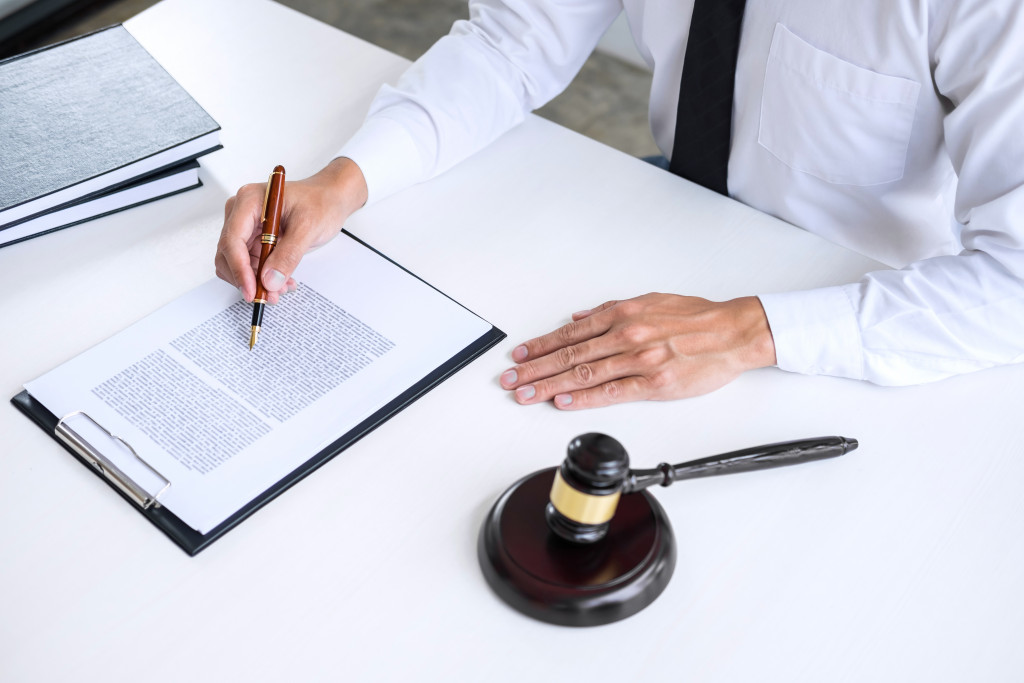
- Businesses should sign contracts before work begins to protect both parties, as contractual breaches can lead to costly losses.
- Evidence should be collected quickly and thoroughly during a breach.
- Disputes should be resolved with an informal resolution or legal action.
- When taking legal action, it is essential to research and prepares evidence and paperwork beforehand.
Businesses partnering with each other must sign a contract to protect both parties and ensure they’re held accountable to their agreed-upon terms. Contracts act as less formal, more specific versions of laws; they help keep parties working together mutually beneficially. Without them, one party could easily take advantage of the other and violate agreements without consequence.
The need for contracts is genuine: according to the International Chamber of Commerce, over 70% of all international business disputes stem from violated agreements or contractual breaches. This can result in hefty costs for both companies involved and disruption to operations – something no business wants. In 2013 alone, contract disputes cost businesses $1 trillion in losses worldwide.
Because of these risks, it’s essential for businesses that partner with each other to sign a contract before doing any work together. A good contract should clearly outline the terms and conditions agreed upon by both parties, such as the duration of the agreement, payment methods and dates, services provided by each party, and procedures in case of violations or breaches. A written agreement helps prevent misunderstandings and establishes legal rules that protect everyone involved in the partnership.
Unfortunately, even with a contract, there’s no guarantee that one party won’t violate the agreement. If this happens, the affected party should act swiftly and decisively. Here are a few steps to consider.
Collect the Evidence
Collecting evidence is crucial in a contract breach dispute. It can provide the proof needed to demonstrate a violation and help both parties understand the terms that have been violated. Evidence should be collected as soon as possible, preferably at the time of the breach, to avoid any chances of it being tampered with or lost.
Evidence may come from various sources, including the following:
Written documents and emails
Most contracts will include written documents and emails between the two parties. Examining these can provide insight into what was agreed upon and which terms were violated.
Financial records
Financial records can help establish a timeline of payments and show discrepancies in amounts or dates one party may have missed.
Witness statements
Having witnesses familiar with the contract is beneficial, especially if they are impartial to both parties involved in the dispute. Statements from witnesses should be collected soon after the breach takes place to determine any changes made to the agreement, intentional or not.
Meeting minutes
Taking notes during meetings or calls between the two parties can help clarify any discussion topics related to the contract.
Photographic or video footage
If physical goods or services are part of the contract, photographic or video evidence can help verify compliance with terms and conditions.
Examine Your Options

Once the evidence has been collected, it’s time to examine all possible dispute options. Depending on the severity of the breach, parties may choose to settle out of court or take legal action.
If an informal resolution is more suitable, both parties can negotiate a solution that works for everyone. This can be done with or without help from mediators and lawyers. Alternatively, if the breach caused severe damages, then formal proceedings via litigation may be necessary. Lawsuits, however, can be time-consuming and very expensive, so it’s essential to examine all options before deciding.
It can be easy to get emotional when dealing with a contract breach dispute, but staying calm is essential for resolving the matter quickly and amicably. Arguing or threatening legal action won’t help; instead, both parties should discuss the situation rationally and professionally to reach an agreement. If this isn’t possible, it may be best to seek outside help from experts specializing in contract disputes.
Taking Legal Action

Unfortunately, the final option when dealing with a breach of contract is to take legal action. This could involve filing a lawsuit, arbitration, or mediation, depending on the severity of the situation and the type of agreement violated. It’s essential to research beforehand to understand which approach would be more suitable for your case and ensure you have all evidence ready before taking legal action.
When filing a lawsuit, getting a reliable court paper process server will be step one. There might be too much paperwork to handle everything on your own, and a professional process server can help ensure that papers are served correctly and promptly.
A legal dispute can be costly and time-consuming, so taking the necessary steps to protect yourself from potential losses is essential. Consulting with a lawyer or an expert in contract disputes can provide valuable advice on proceeding with the case. It will also help you understand the options available to resolve the issue.
Final Thoughts
The best way to avoid a breach of contract is by being proactive – establish clear terms before agreeing, keep records of all communication between parties, and review contracts regularly for any changes or updates. Taking these extra steps can save you time and money in the long run if a dispute arises.
Leave a Reply